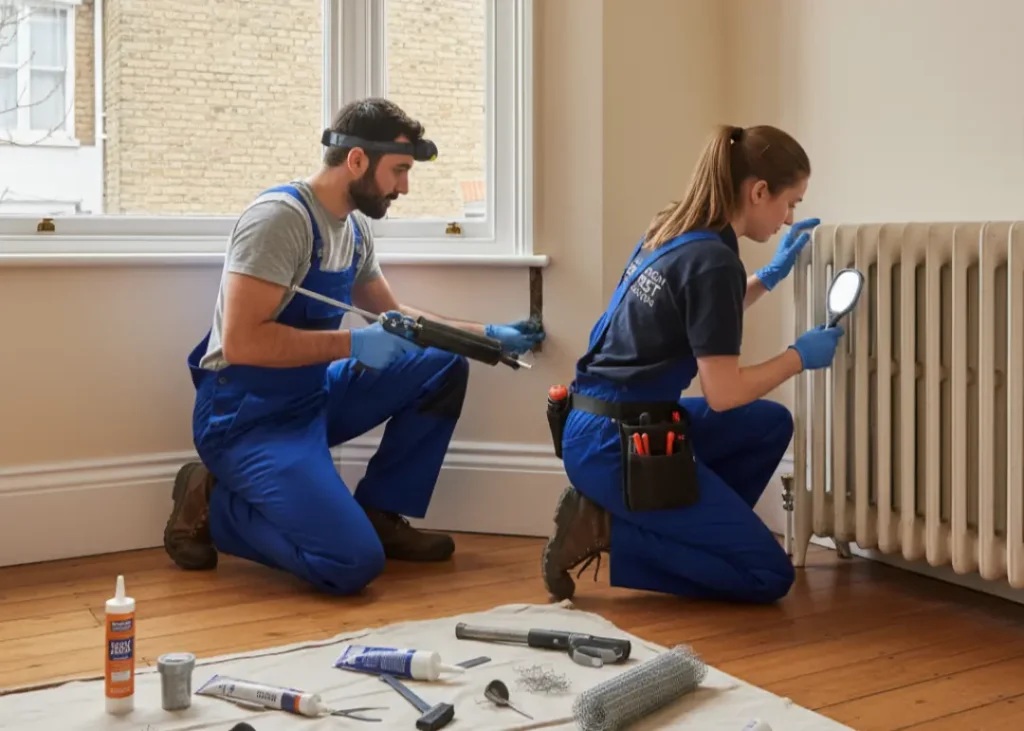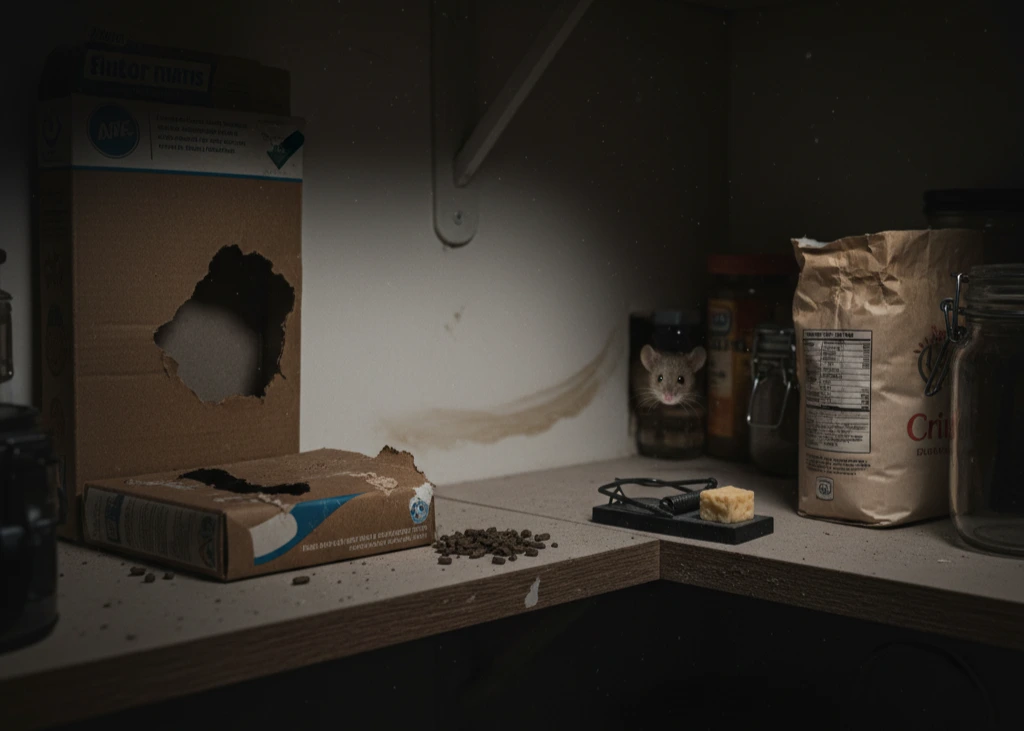Prevention is way better than a cure. Aren’t mice proofing better than using rodenticides later? Once infested, it’s pretty challenging and costly to exterminate mice. One-time pest control might work in the short run —but a long-term solution lies in determining and addressing how they are entering your home in the first place. In this guide, you will learn why mouse proofing is essential, when and how you should do it.
Why is Mice Proofing Important?
Without mouse proofing, mice can invade, infest, and eventually become a nuisance. Extermination is required when you are left with no options. However, the best way to prevent mice is by eliminating the root cause of their invasion. Here’s why mouse-proofing your home is essential:
- A mouse can carry the germs of plague, Hantavirus(respiratory issue), Salmonellosis(food poisoning), LCM virus, Leptospirosis(fever, muscle pain), etc.
- They can gnaw away essential cables and destroy electronics.
- Mice can turn expensive furniture unusable.
- They contaminate foods and make the whole place unhygienic.
- They create squeaking and scratching sounds at night that disturb a peaceful sleep.
- Unpleasant odours and nasty droppings impact the living condition and value of the house.
Step-by-Step Guide: Proven Ways to Keep Mice Out
The best thing about prevention? It hits at the root cause. Executing a well-planned and proven strategy can be the key to preventing mice. Let’s delve into the step-by-step proven ways of mouse-proofing.

Remove Food Sources and Spills
Keep dry foods, pet foods, birdseeds, and leftover foods in glass, metal, or thick plastic airtight jars/boxes. You must clean up the kitchen countertop right after working there. Clean up any food leftover, dishes, or juice spills after dinner. Never leave ripe fruits, pet food, or water open overnight. You should keep the house clean and free from traces of food after eating.
Once you store food in airtight boxes, you can seal the holes and cracks and eliminate all the food smells. Look for the entry points first.
Determine the Entry Points
Addressing the invading holes and cracks is mandatory. A small hole over 5mm is enough for a mouse to enter your house. Don’t leave any portion without inspection. Walls, underfloors, pipes, chimneys, roof, etc., must be checked. These are the common entry points of the mouse:
- Gaps or cracks around 6mm in the concrete or brick.
- Utility Pipe entering holes.
- Vents/Exhausts(Bathroom & Kitchen).
- Under doors.
- Holes around the roofline, eaves, etc.
- Chimneys.
- Uncapped flues.
- Drain penetrations.
- Wall holes.
- Around Insulations.
- Window openings.
- Backyard door.
- Opening near tree branches.
Seal the Holes, Gaps, & Cracks
Use sealants to eliminate all the entry points. Now the question can be, which sealants are the most effective against rodents? Here are the proven sealants that work against mice effectively-
■ Steel Wool(Soft/Coarse): Steel wool works efficiently to prevent rodents. Mice don’t like to chew metals. That’s why they can’t invade through steel wool. Coarse steel wools work the best.
■ Copper/Metal wire Mesh: Again, mice hate metal mesh. These wire meshes are pretty good. Also, cover the vent gaps with wire meshes.
■ Silicon Caulk: Silicon caulk is a paste-like material. Apply a large amount to cover the full holes. Let it dry. It will harden, and mice will be unable to pass through.
■ Rodentproof door sweep: Door sweeps are amazing for preventing mice from entering under doors.
■ Chimney Caps: Use chimney caps to seal the chimney and prevent mice.
Manage Exterior Accesses
Eliminate all access for rodents through the exteriors. Tree branches and shrubs must be cut down so that they remain 5-6 feet away from the house. Also, trim the grass. Dump the trash in locked trash bins wrapped in a foil bag. Keep the trash bin a few feet away from the house. Use lidded bins for both indoor and outdoor use. Remove any clutter that can be a shelter for rodents.
How Do I Know My House Is Mice-Infested?

Mice often build nests near food sources in the house. They squeak and increase activity when it’s nighttime. You may see a visible mouse roaming in the crawling areas. However, there are other signs of mouse infestation. The signs are:
Droppings: Mice leave rice-sized black droppings. According to BPCA, a mouse leaves about 80 droppings per day.
Urine smell: A mouse has an unpleasant body odour. Moreover, their urine also smells odd and hints at a mouse infestation.
Gnawed Pieces: You may hear chewing sounds. Mice can gnaw essential wires. They leave the gnawed pieces of wires or food packages, indicating their presence.
Grey Smear Marks: When roaming, a mouse can roam on their urine or any liquid. Often, their body hair leaves grey smear marks on the floor.
Odd Sounds: Mice make sounds like chirps or squeaks. They also make sounds when running around.
What is the Best Time for Mouse Proofing?
Mice start invading houses in the early winter for food and shelter from the cold outside. Before they enter, you must protect your house from the inside and outside. So, early spring is the perfect time for mice-proofing your house.
You can also take extra protection in late autumn. However, you should keep the house clean and store food safely all year round.
When to Hire Professionals for Mice Proofing in London?
You can take some basic steps to mouse-proof your home on your own. However, if you want complete prevention, it’s best to hire professional pest controllers in London. They are skilled at identifying entry points and can provide effective mice-proofing solutions for your residence. If you’re considering prevention and don’t currently have an infestation, a DIY approach may be sufficient. However, if mice have already invaded your home, it’s important to seek both professional extermination and proofing. Call us today, let us have a look and suggest the best course of action.
Final Words
Exterminating mice isn’t enough. Mice are sneaky; if they get the chance to invade, they will! So you’ve no other choice left other than mice proofing your London home. However, you need to be careful about the time you choose for mouse prevention. If you’re sealing entry points when mice have already built nests, that’s worth nothing.
Mouse proofing can save you from expending on pest control technicians and pesticides. Most importantly, it will secure peace of mind and stress-free sleep. Taking this preventive step is the key to maintaining a safe and comfortable living environment.
FAQs About Home Mice Proofing in London
How to completely mouse proof your house?
Remove food and water sources, seal the entry points, and trim vegetation to keep mice out of your house. A strategic mouse-proofing can completely prevent mice.
What actually keeps mice away?
Metal sealants and essential oils(peppermint oil, clove oil, etc) can keep mice away. However, you must remove food sources. If it vanishes, the mice will go away soon.
What is the quickest way to get rid of mice in your house?
Mouse proofing keeps mice away. However, if they invade somehow, the first technique can be trapping them. If you can’t control it alone, hire a residential pest control service.
What time of year are mice most active?
Mice are most active all year. They remain more active indoors in the late summer and early winter, and on warmer days, they remain active outdoors. Their population is highest in the late summer.
Will mice leave if there’s no food?
Mice build nests near food and water. Also, they want shelter from the cold. However, they can’t live more than a few days without food. So, eliminating food sources will eventually force them to move somewhere else. Even if they stay in the shelter for a while, soon they will move.
Do mice come near sleeping humans?
Yes, they do, especially if there are any food sources in the bedroom. Mice become active at night and roam for food and water. They often pass sleeping humans as they inspect the entire house for food sources.
Does steel wool keep mice out?
Yes, they do. Many proven tests showed that mice can’t invade through a hole sealed with steel wool. Usually, mice hate chewing metals. Steel wools keep mice from invading through. Try using coarse steel wool.
